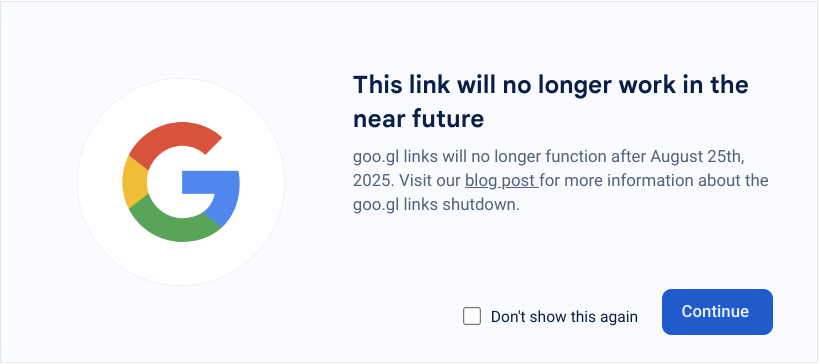Google has announced that its URL shortening service, goo.gl, will be entirely disabled by August 25, 2025. Initially launched in 2009, goo.gl offered a convenient way to create shorter, more manageable links from lengthy URLs, aiding in easier sharing and tracking of link performance.
In 2018, Google started phasing out goo.gl in favor of Firebase Dynamic Links (FDL). This transition was prompted by changes in how users interact with content online and the rise of alternative URL-shortening services. While goo.gl stopped accepting new URLs in 2018, existing links continued functioning. Now, Google is taking the final step by discontinuing the serving of these links altogether. It is worth pointing out that FDL is also getting deprecated simultaneously, indicating that Google has no interest in hosting any links.

From August 23, 2024, users will notice a new interstitial page appearing for some goo.gl links, notifying them of the upcoming shutdown. This interstitial page is designed to help users track and update affected links before the service is entirely disabled.
The interstitial page will initially affect a small percentage of links, gradually increasing as the shutdown date approaches. This transition period allows users to adjust and migrate their links to other services. However, Google warns that the interstitial page might disrupt the flow of goo.gl links, especially for those using other redirects or embedded social metadata. To mitigate this, users can add the query parameter “si=1” to their goo.gl links to suppress the interstitial page.

The discontinuation of goo.gl marks the end of an era for many developers and marketers who relied on its simplicity and efficiency. According to link-checking services, at least 3.2M websites link to “goo.gl” links in some shape or form, with 1.8B links across all those sites. This decision will cause significant inconvenience and disruption in the long-term, leading to widespread link rot and broken access to otherwise interesting web content.
It’s disappointing that Google appears indifferent to the impact on users who trusted and built their systems around this service. It also highlights the challenges and frustrations of relying on services from tech giants who can abruptly change course. Google has a notorious reputation for doing this tough, as is evident by the 295 discontinued services and products listed on Killed by Google.
Users’ discontent with this news is palpable, with many expressing disappointment and anger over Google’s decision. Some see it as “irresponsible cultural vandalism,” leading to widespread link rot and the loss of valuable internet history.
Others lament the disruption this will cause, particularly for archives and mailing lists with thousands of affected links. The Linux Kernel mailing list returns 19,000 results when searching for “goo.gl” links in its historical archives. These links often lead to valuable resources or otherwise important pages that contextualize specific discussions.
Suggestions for preserving the links range from archiving the links on services like the Wayback Machine to running scripts to dereference shortened URLs.
